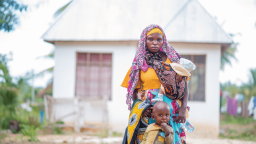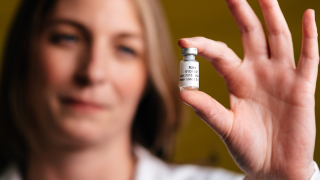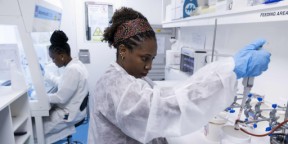A new malaria vaccine provides 80% protection
Malaria booster vaccine, R21 shows continued high efficacy in children, meeting WHO-specified 75% efficacy goal
Researchers from the University of Oxford’s Jenner Institute have today reported promising new findings from their Phase 2b trials following a booster dose of the R21/Matrix-M™ malaria vaccine - which was previously demonstrated to be 77% effective in young children.
The Institute found that a vaccine booster dose at one year, following a primary three-dose regime, maintained high efficacy against malaria and continued to meet the World Health Organization’s Malaria Vaccine Technology Roadmap goal of a vaccine with at least 75% efficacy.
Almost half a million children died from malaria in 2020 and yet, with the right mix of treatments and prevention deployed at the right time, in the right places, this disease could be eradicated for ever. British science has long been at the forefront of producing the ever more effective tools that can transform lives. Today’s R21 vaccine results from Oxford’s renowned Jenner Institute are another encouraging signal that, with the right support, the world could arrive at the destination of ending child deaths from malaria in our lifetimes.
However, malaria is too complex a disease for any one tool to defeat on its own, and there is no silver bullet. To get back on track in the fight against malaria, the use of vaccines will need to be balanced alongside continued investment in efforts to expand access to and optimise the use of, existing interventions. If approved, R21 will add another tool to our malaria toolbox.
British-backed science is leading the development of other lifesaving malaria interventions, including next-generation insecticide-treated nets, digital diagnostics, genetically modified mosquitoes, and cutting-edge antimalarial drugs.
To ensure that the right tools get to the right people at the right time, it is vital that the UK Government commit to long-term financing for malaria research and innovation and make an ambitious pledge at The Global Fund’s Seventh Replenishment Conference on September 19th in New York.

To cut the death rates across the three diseases by 64% and ensure that a further 20 million lives are saved by 2026, this year the Global Fund is aiming to raise a total of $18 billion - the minimum required to get the world back on track toward ending three of the world’s most deadly infectious diseases – with a call for all donors, including the UK, to step up their previous commitments by 29%.
For new British inventions to achieve their historic potential, they need strong programmes and health systems to ensure that the children that need them get them. For that, British leadership must continue, not least at the imminent September US hosted conference. This conference will be the new PM’s first foreign policy test. For the sake of millions of children’s lives, global health security, and British relations with its closest ally, it’s a test she cannot fail.






